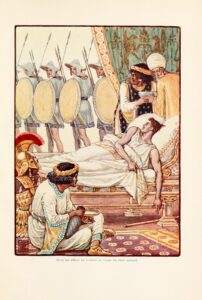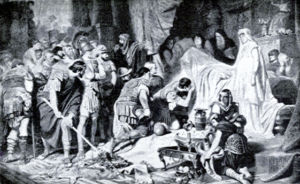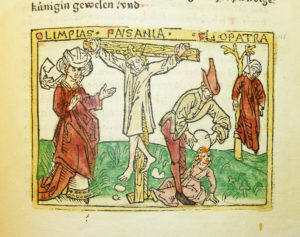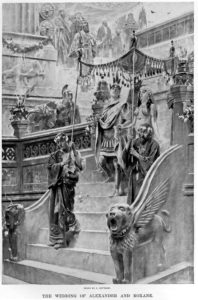
The World Was Not Enough
A tomb now suffices him for whom the world was not enough. — epitaph on the tomb of Alexander the Great
Kings who conquer huge swathes of the known world before they are in their mid-thirties generally don’t die outside of battle, so it should come as no surprise that the rumors of poisoning began to circulate before the year of his death was out.
Even before he died, there was rumbling amongst his soldiers, who felt they had been kept from seeing the truth of their commander’s condition by his closest friends and bodyguards.
I imagine some [soldiers] suspected that his death was being covered up by the king’s intimates, the eight bodyguards, but for most their insistent demand to see Alexander was an expression of their grief and longing for the king they were about to lose. They say that Alexander could no longer speak as the army filed past him, but he struggled to raise his head and give each man a greeting with his eyes. — Arrian of Nicomedia
Alexander had earned the devotion of his men with his deeds and his life shared with them. He demonstrated enormous courage and skill, as well as tremendous loyalty. All of this created a deep trust that was shown in their insistence on showing final respects to the King of Macedonia.

But the glories of Alexander had begun to tarnish in the last year of his life, and it was perhaps this, and the events which followed his death, that gave a vague aura of truth to allegations of poisoning.
The introduction of Persian customs into Alexander’s Macedonian court had incensed his men. After conquering Persia, Alexander dressed as a Persian and instituted the practice of proskynesis – the practice of bowing and kissing hands of those of higher rank. He ordered the marriage of his men to Persian wives. And in addition, Alexander began combining Persian and Macedonian troops and promoting Persians to positions of importance.
Even Alexander’s greatest and oldest friends and generals began to protest and make plans. Perhaps signaling the start of Alexander’s mental slide, in 330 Alexander found the son of one of his per-eminent generals plotting an assassination. He executed the son, Philotas, and then executed his general, Parmenio, as well. In 328 BC Alexander killed his friend and general Cleitus by running him through with a spear after Cleitus began to question Alexander’s achievements during what could only be compared to a drunken fraternity party.
In 327 Alexander had the great-nephew of Aristotle put to death for treason, ending his relationship with his former teacher.
Alexander’s horse Bucephalus died. Then Alexander’s best friend (and some say lover) Hephaestion died. Alexander’s grief was so intense that he had Glaucias, the doctor who was unable to cure Hephaestion, crucified.
If Alexander’s paranoia was increasingly growing, his vaunted command was no longer winning as it had done in the past. His army’s march through the Gedrosian Desert had been devastating, and his arrival in Babylon seemed fraught with terrible omens. According to the Priests of the God Bel, it was an inopportune time for him to enter into Babylon, possibly to result in death. Then, Alexander’s diadem fell off into one of the streams surrounding Babylon. A Persian attempt to divert the bad karma by sitting a regular person on Alexander’s throne was seen by the Macedonians as a bad omen in itself.
And then came the military banquet. Alexander hosted a banquet for his army, to celebrate the end of the campaign in India and the campaign in Arabia to come. It was reported that Alexander was already not feeling well, but he drank to excess even by the standards Alexander had already set.
The day after this drunken bacchanalia, Alexander was significantly more sick. He attempted to rise from his bed, but a pain lanced through his back with enough severity that he screamed and fell back.

For several days Alexander grew worse and worse, until on the tenth day he died. His body was not immediately dealt with, and according to Plutarch, “The king’s body had been lying in the coffin for six days while everybody’s attention had been diverted from the obsequies to forming a government… When Alexander’s friends eventually found time to attend to his corpse, the men who entered the tent saw that no decay had set into it and there was snot even the slightest discoloration.“
Analysis of Alexander’s symptoms has been a cottage industry of medical historians for about two thousand years, and theories range from malaria to typhus to alcohol poisoning to murder. Murder is, of course, the most exciting possibility.
Some of Alexander’s symptoms line up with some poisons, and others don’t line up with poisons, but the evidence that contemporaries believed he had been poisoned almost immediately carries some weight. Onesicritus, who accompanied Alexander on his campaigns, wrote about a plot to assassinate Alexander, although he did not give out names. Plutarch, writing a few hundred years after Alexander’s death from contemporary sources, stated that Hypereides proposed honors be given to the poisoner. Stories circulated involving every single member of the Diadochi (the four men who took control of Alexander’s empire), and were probably promulgated by each of the rulers in an attempt to strengthen their own positions.

In 317 Alexander’s mother Olympias used Alexander’s murder as an excuse to eliminate her enemies, killing one of Antipater‘s sons and despoiling the tomb of another. The accusations against Antipater were strong enough that he had to take action to tamp them down – by capturing Hypereides, cutting his tongue out, and executing him.
Suspicion also fell upon Alexander’s widow Roxana and their son Alexander IV, who were both murdered by Antipater and Cassander in 310 BCE.

Unfortunately for the world, without Alexander’s body (hijacked by Ptolemy on its way to Macedonia and lost to history somewhere in Alexandria, Egypt), not much can be determined with any degree of certainty about Alexander’s death. Like the board game Clue, everyone had means and motive and behaved suspiciously, including Mother Nature.
As Alexander himself said, “Upon the conduct of each depends the fate of all.”
To read more about Alexander the Great, please click here.
- June 9, 2021
- History
